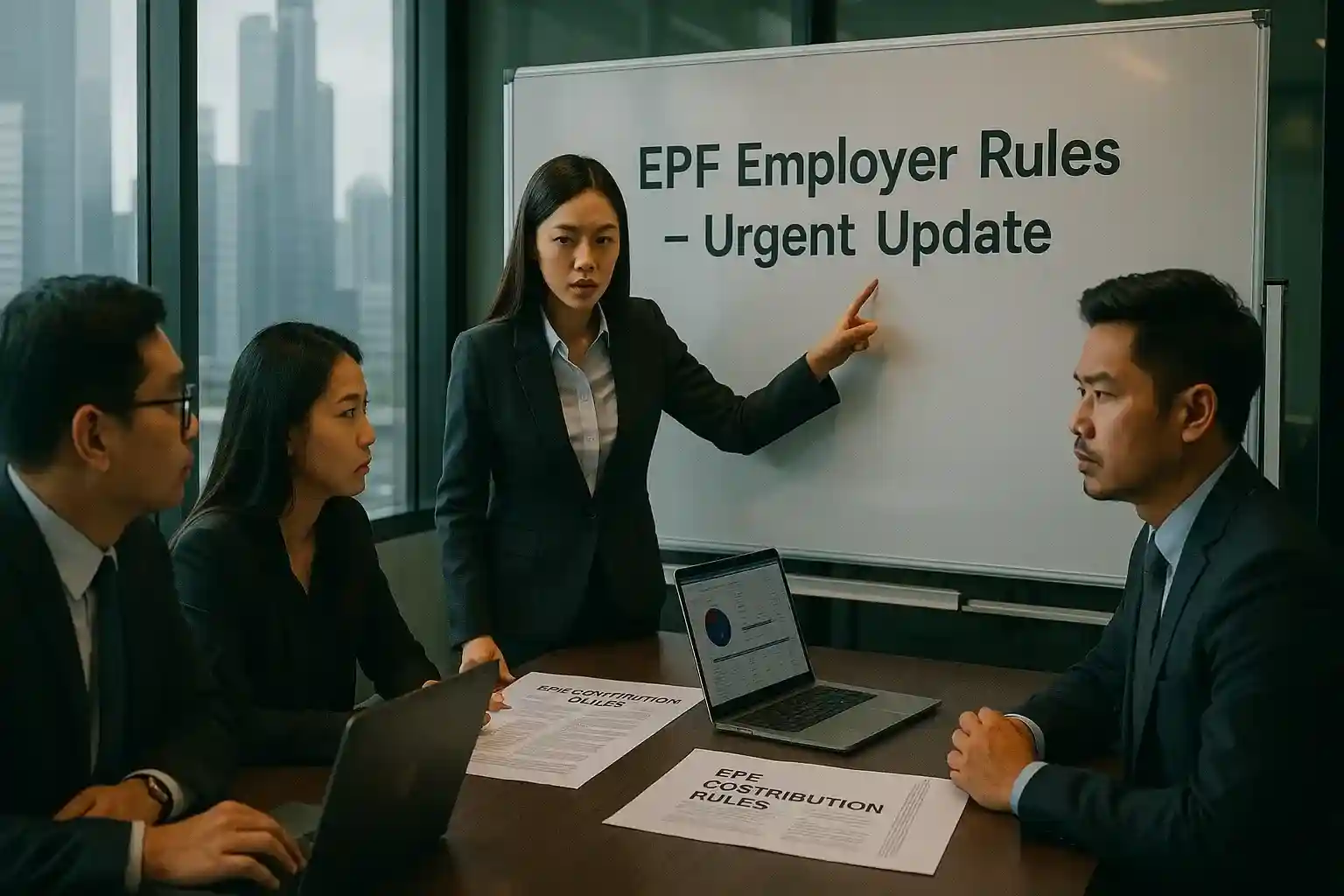3 Key Takeaways:
- Staying compliant with EPF company contribution rules is critical to avoid legal penalties and employee dissatisfaction.
- Understanding the 10 key EPF rules helps SMEs, startups, and HR teams manage payroll accurately and stay aligned with Malaysian labor laws.
- Outsourcing HR and payroll functions to experts like MUSTRE ensures accurate contribution, reduces admin burden, and supports overall business efficiency.
The EPF company contribution is a mandatory component of payroll compliance in Malaysia — and understanding how EPF company contribution rules work helps businesses stay compliant and maintain employee trust.
Whether you’re an SME, a startup, or an expanding company, understanding the contribution of EPF — including how both employer and employee shares are calculated — is vital for compliance.
Hire us!
Elevate your business with tailored HR solutions, including compliance, talent acquisition, culture building, and streamlined processes. Unlock success today!

Yet, many business owners and HR teams underestimate the complexity of EPF company contribution regulations and reporting procedures.
From contribution rates based on employee age to mandatory registration and prohibited deductions, there are numerous rules that can easily be overlooked—especially if your payroll is handled manually or by a non-specialist team.
Failure to comply can lead to late payment charges, inaccurate reporting, or worse, reputational damage with employees and authorities.
Yet, many business owners and HR teams underestimate the complexity of EPF company contribution regulations and reporting procedures to ensure accuracy, compliance, and peace of mind.
These rules are particularly relevant for businesses navigating workforce diversity—such as hiring senior employees or foreign nationals—as the contribution obligations vary accordingly.
For SMEs and startups with limited HR resources, these rules can feel overwhelming.
That’s where outsourcing your payroll and HR operations can make a significant difference.
Companies like MUSTRE (MTR Solutions Sdn Bhd) specialize in handling these intricacies, offering payroll, HR consulting, and compliance services to help businesses operate smoothly and legally.
If you’re unsure whether your current payroll process adheres to all 10 EPF contribution rules, this guide will clarify the essentials and offer actionable insights.
Read on to discover the rules, the challenges businesses commonly face, and the best practices to ensure you’re doing things right—from day one.
Is Your Payroll Team Aware of These 10 EPF Company Contribution Rules?

1. Mandatory Employer Registration
All employers in Malaysia are required to register with EPF as soon as they hire their first employee.
This ensures legal compliance and sets up a proper channel for monthly contributions.
2. EPF Employee Contribution Rate and Employer Responsibilities
Employers must calculate EPF contributions based on the employee’s monthly wage and age, taking into account the EPF employee contribution rate as determined by KWSP.
For employees below 60 years, the standard employer rate is 13% (for those earning RM5,000 and below) and 12% (for those earning above RM5,000).
3. Reduced Contributions for Employees Aged 60 and Above
Employers contribute at a reduced rate (4%) for employees aged 60 and above.
These employees contribute 0% to EPF by default unless they opt in.
4. Fixed Employer Contribution for Certain Foreign Employees
For foreign workers who are not Malaysian citizens and not permanent residents, employers may make a flat contribution of RM5 monthly, depending on employment terms and exemptions.
5. Timely Payment of Contributions

All EPF payments must be made by the 15th of the following month.
Late payments incur dividends and penalties, which can impact business cash flow and credibility.
6. Prohibition on Deducting Employer's Share from Employee's Salary
Employers are strictly prohibited from deducting their share of EPF contributions from the employee’s salary.
Doing so is a breach of law and subject to heavy penalties.
7. Liability for Late Payments
If an employer fails to pay on time, they are liable for dividend interest and late payment charges of up to 6% per annum.
It reflects poorly during audits and damages company credibility.
8. Inclusion of Various Payments in EPF Calculations
Contributions should not be based on basic salary alone.
Payments such as allowances, overtime, commissions, bonuses, and incentives must be included in the EPF calculation unless specifically exempted.
9. EPF Contribution for Employee: Mandatory Obligation for All Workers
The EPF contribution for employee is mandatory for anyone earning more than RM10/month, regardless of job title or duration, unless exemptions apply
10. Voluntary Excess Contributions

Employers may choose to contribute more than the statutory rate as a benefit to employees.
These voluntary excess contributions must still be reported and paid accurately.
"The team has consistently handled our payroll with dedication and always accurate in processing our payroll and addressing any queries regarding salary structures and related policies."
drnaz
Key Benefits of Understanding EPF Company Contribution Rules
Why These EPF Company Contribution Rules Matter
- Avoid legal penalties: Non-compliance can result in hefty fines.
- Ensure employee trust: On-time contributions foster loyalty.
- Simplify audits and LHDN checks: Accurate records mean smooth processes.
"I’ve been using Mustre's HR services, and it has significantly reduced the burden of managing my staff and HR matters. Highly recommend Mustre for anyone looking for reliable and efficient HR solutions!"
Noor Ariffshah
How Awareness Improves Payroll Accuracy
- Payroll teams can avoid misclassifying components.
- Ensures all calculations align with statutory rates.
- Avoids manual errors and salary disputes.
Additional Factors to Consider
- Keep updated on EPF policy changes.
- Ensure automation tools reflect the latest rates.
- Maintain documentation for audit and reference.
Common Challenges in Managing EPF Company Contributions
What Are the Biggest Obstacles?
- Confusion over contribution rates and age-based rules.
- Misinterpretation of rules for foreign workers.
- Manual payroll systems leading to calculation errors.
"There are many weak clauses in the agreement prepared by my old HR consultant. Puan Mastura helped solve my problem and prepared a compliant agreement. Recommended service!"
NORHAYATI ABU TALIB
How to Overcome These Challenges
- Conduct periodic training for payroll and HR staff.
- Use professional HR consultants like MUSTRE.
- Implement automated payroll software with EPF compliance features.
Best Practices for Staying Compliant with EPF Company Contribution Rules

Actionable Tips for Success
- Prepare a monthly EPF checklist.
- Cross-check payslip details before finalizing payments.
- Create a dedicated compliance calendar.
Tools & Resources to Help You
- KWSP i-Akaun: For online submissions and account tracking.
- Payroll Software: Use trusted systems that auto-calculate EPF.
- HR Outsourcing: Services like MUSTRE that manage payroll and compliance end-to-end.
"Clear, fast, and professional communication. This HR service makes it easy for us to manage salaries, holidays, etc. No need to hire HR staff. Outsource it!"
Nurul Atiqah Shamsudin
Master These EPF Rules to Protect Your Team and Company
“Staying compliant with EPF company contribution rules and reporting obligations isn’t just about ticking boxes—it’s about protecting your workforce and brand reputation.
By understanding these 10 rules, your payroll team can operate with clarity, avoid costly mistakes, and foster trust within your workforce.
Whether you’re managing internal payroll or considering outsourcing, mastering these basics is essential for sustainable growth.
Not sure if your current payroll process is fully compliant? Let the experts at MUSTRE take the weight off your shoulders.
With professional HR and payroll outsourcing services, we help you simplify your processes, avoid legal pitfalls, and focus on growing your business.
📞 Whatsapp now for a free consultation today—discover how structured HR practices can elevate your business efficiency and employee satisfaction.
Frequently Asked Questions (FAQ)
1. What is the EPF company contribution rate for employers in Malaysia?
For employees below 60 years old, employers are required to contribute 13% for monthly wages of RM5,000 and below, and 12% for wages above RM5,000.
For employees aged 60 and above, the employer rate is reduced to 4%, while the employee PF contribution may vary based on age and opt-in status.
2. Can foreign workers receive EPF company contributions?
Yes, but with conditions.
Employers may contribute a flat RM5 per month for certain foreign employees who are not Malaysian citizens or permanent residents, depending on their employment status and EPF exemption.
3. What payments must be included in EPF company contribution calculations?
In addition to basic salary, EPF contributions must include allowances, overtime, commissions, bonuses, incentives, and other forms of regular payments unless specifically exempted by EPF.
4. Is it legal to deduct the employer's EPF contribution from the employee’s salary?
No.
Employers are strictly prohibited from deducting their share of the EPF contribution from the employee’s wages.
This is considered a violation and may result in legal penalties.
5. What happens if EPF company contributions are paid late?
Late EPF payments may incur dividend charges and a late payment fine of up to 6% per annum.
Continued non-compliance can affect your business reputation and financial standing during audits.











